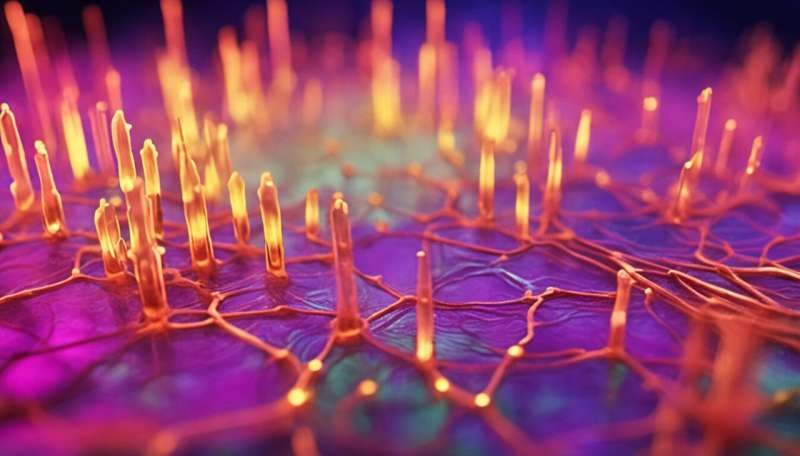[ad_1]

Credit: Andrii Vodolazhskyi/Shutterstock
It’s a story straight out of science fiction—scientists have grown human brain cells in the lab and taught them to play the video game Pong, like squash or tennis. . But this did not happen on the big screen. It happened in a laboratory in Melbourne, Australia, and the main question arose about the legality of these so-called neural networks.
Are they the property of the team that created them, or do they deserve some kind of special status—or do they?
The reason this question needs to be asked is because the ability to play pong may be a sign that these lab-grown brain cells have mastered thinking—usually the ability to understand and respond to a world outside of you. And it is widely believed that reason is a high threshold for moral authority. Ethicists believe that sentient beings can have a moral right not to be harmed, and an understanding of the psychological implications of this can be embedded in research involving animals.
If Melbourne’s neurons are alive, this means they can feel pain—perhaps through pain or through pain. Since it is widely considered moral to avoid causing unnecessary pain, this may mean that there are moral limitations on what we can do with these neural networks.
It’s safe to say that the team that created the cells didn’t even think it was there because the closed system in which the experiment was done was meant to be, even if we accept that the neurons are responding to an external stimulus. , we do not know that they are working consciously and knowing how their actions will produce certain results.
But where we are, it’s not beyond what imagination can do next. And if this is true, it’s not just ethicists who should be paying attention—lawmakers should be taking a hard look at this technology.
The legal problem
Because, since Roman times, the law has classified everything as people or property. Legal persons can carry it directly. However, assets are intangible. So, if we think that our neural networks will have moral authority, and this should be reflected in legal protections, we need to understand that they are not property – but legal persons. And the case of Happy, an elephant at the Bronx Zoo whose fans want to transfer to an elephant shelter, shows why this is something we need to be strong about.
The New York courts were asked whether Happy had a right to freedom and said no—because he was not a legal person. Here’s an overview of the case, but for our purposes, the most important thing to take away from the judgment is this: the courts agreed that Happy was a moral person who deserved the protection of rights, but did not have the ability to the job. This is because changing its legal status from property to a person is a huge change for them. Instead, it’s up to the council—choosing not to do it.
Recognizing a moral claim they cannot enforce, the courts—and the law in general—uphold what is admittedly wrong. This comes as a shock when you consider that the word “legal person” has never been synonymous with “person”. Throughout history and legal systems around the world we have seen temples, statues, ships, institutions and rivers that have been considered legal entities. Rather, it is merely a sign that the defendant may have legal rights.
The lesson we can take from this is that the law must be transparent in the future. It’s better to be able to avoid a potential problem before trying to play it when it’s already happened.
As we mentioned above—this problem is evident for Melbourne neurons. Even if they’re not alive yet, the potential is there—so it’s worth our attention. Because if we accept that these relationships are conscious, and that people have rights because of this, we want the law to reflect this and offer protection that matches their needs.
This is not a revolutionary claim, and we have been prepared before. When IVF technology first appeared in the 1980s, the law had to address the question of the legal status of in-vitro embryos for the first time. The approach taken was to set up an inquiry to examine the moral questions raised by this new technology, culminating in the evidence contained in Warnock’s report. These recommendations formed the basis of the UK’s legal framework for IVF, which creates a kind of “third status” for these embryos—not all legal persons, but with significant restrictions on what can be done. able to them because of their moral authority.
The effects of Warnock’s report are still felt today—so there is no reason why the same cannot be done about the issues raised in Melbourne. Indeed, there are still many unanswered questions about the power of these neural networks, and we may very well decide that they do not deserve legal protection.
But there are enough questions about this technology to warrant trying to find answers.
Provided by Te Korero
This article is reprinted from The Conversation under a Creative Commons license. Read the original article.![]()
View: Can adult brain cells play Pong—so should they be legal? (2022, November 3) retrieved on November 3, 2022 from https://medicalxpress.com/news/2022-11-lab-grown-brain-cells-pongso-legal.html
This article is subject to copyright. Except for legitimate purposes for individual study or research, no part may be reproduced without written permission. Content is provided for informational purposes only.
[ad_2]
Source link
